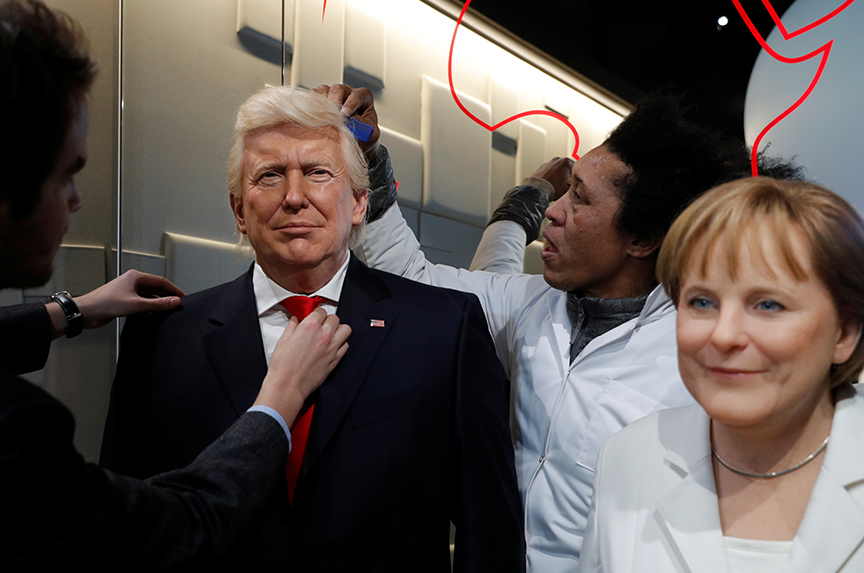
Interview with Anthony Gardner, a former US ambassador to the European Union
US President Donald J. Trump’s decision to withdraw from both the Iran nuclear deal and the Paris climate agreement as well as threats to impose tariffs on imports of European steel and aluminum have put transatlantic relations on the worst footing since the split over the Iraq war in 2003.
“We’re mixing up our allies and our enemies,” said Anthony Gardner, who served as the United States’ ambassador to the European Union (EU) from 2014 to January 20, 2017.
“You don’t point guns at the heads of your allies,” he added.
Both the Trump administration and the European Union (EU) keep repeating that they don’t want a trade war, but intensifying tit-for-tat threats of tariffs, penalties and barely-veiled insults make it appear they already have one.
Trump’s withdrawal from the Iran nuclear deal, the Joint Comprehensive Plan of Action (JCPOA), on May 8 was the latest and most stinging slap in the face to the EU, whose foreign policy chief, Federica Mogherini, had shepherded the six-party accord through to signature in 2015. The EU’s most powerful leaders, German Chancellor Angela Merkel and French President Emmanuel Macron, along with British Foreign Secretary Boris Johnson, had all delivered personal last-minute appeals to Trump to keep the deal and pursue in parallel his other concerns about Iranian behavior.
“The world is a turbulent place. We’ve got a lot of enemies out there—real enemies, people who… really want to undermine our democracy and who pose a true military and security threat,” said Gardner.
“The EU is an ally,” he added.
EU uses phone-a-friend
And yet Trump has not dispatched an ambassador to the EU—though one has finally been nominated. This is seen as at best an insulting failure to prioritize the United States’ number-one trading and security partner and at worst a purposeful slight to the bloc Trump has often ostracized.
The European Parliament’s foreign affairs committee, desperately seeking insight, recently invited Gardner to share his views, despite his departure more than a year and a half ago.
Gardner has received plenty of worried phone calls of late. He believes the sentiment is warranted. “On the whole it’s not a pretty picture,” he acknowledged. “And I think all of that flows from the general view of [the Trump] administration [that] the European Union isn’t a credible, effective partner of the United States and that’s just mistaken in my view.”
“For sixty years we’d been working with the EU and before, the European communities, on a whole range of issues,” he noted, from climate change to humanitarian assistance to data privacy and energy cooperation. “On nearly all of those issues there’s been a risk of serious damage” from Trump actions, he said.
Gardner lauded the EU’s determination to keep the Iran deal together without the United States and even to prepare retaliatory economic measures, including refusing to negotiate on trade, if Washington doesn’t take the steel tariff threat off the table permanently.
Strength in numbers
He also called out any EU members who may try to secure their own exclusion from the US tariffs. “Some countries of the EU have been trying to get special deals, special waivers,” he noted. “I think that’s a very dangerous path. The EU needs to stay united; it needs to send a united message to Washington: ‘We won’t negotiate with a gun to our head.’”
At the same time, Gardner reminded, “This is not the first time we’ve had turbulent relations. We faced a tough time during [former National Security Agency subcontractor Edward] Snowden [when the extent of US eavesdropping on allies was revealed]. We faced a tough time during the Iraq war. We faced tough times before,” he said, “and we overcame all of them because the importance of the relationship dominates any particular issues of the day.”
Wishing his successor success
Gardner hopes the impending arrival of his successor, Gordon D. Sondland, will help smooth things over. While serving in Brussels, Gardner made many diligent visits to lawmakers and other EU thought leaders to keep open lines of communication. His predecessor, William Kennard, had done the same.
Sondland has called Gardner to ask for advice. Gardner said he underscored to the nominee that there’s a “very detailed set of issues” on the table at a “very difficult time in US-EU relations.”
“It will require a great deal of tact and diplomacy,” he said. “I’m sure he’ll do well—I wish him well.”
Teri Schultz is a Brussels-based freelance journalist. You can follow her on Twitter @terischultz.
Image: Technicians adjusted a waxwork of then US President-elect Donald J. Trump, which was presented next to a waxwork of German Chancellor Angela Merkel at the Musee Grevin in Paris on January 19. Trump will meet Merkel in Washington on March 17. (Reuters/Philippe Wojazer)
